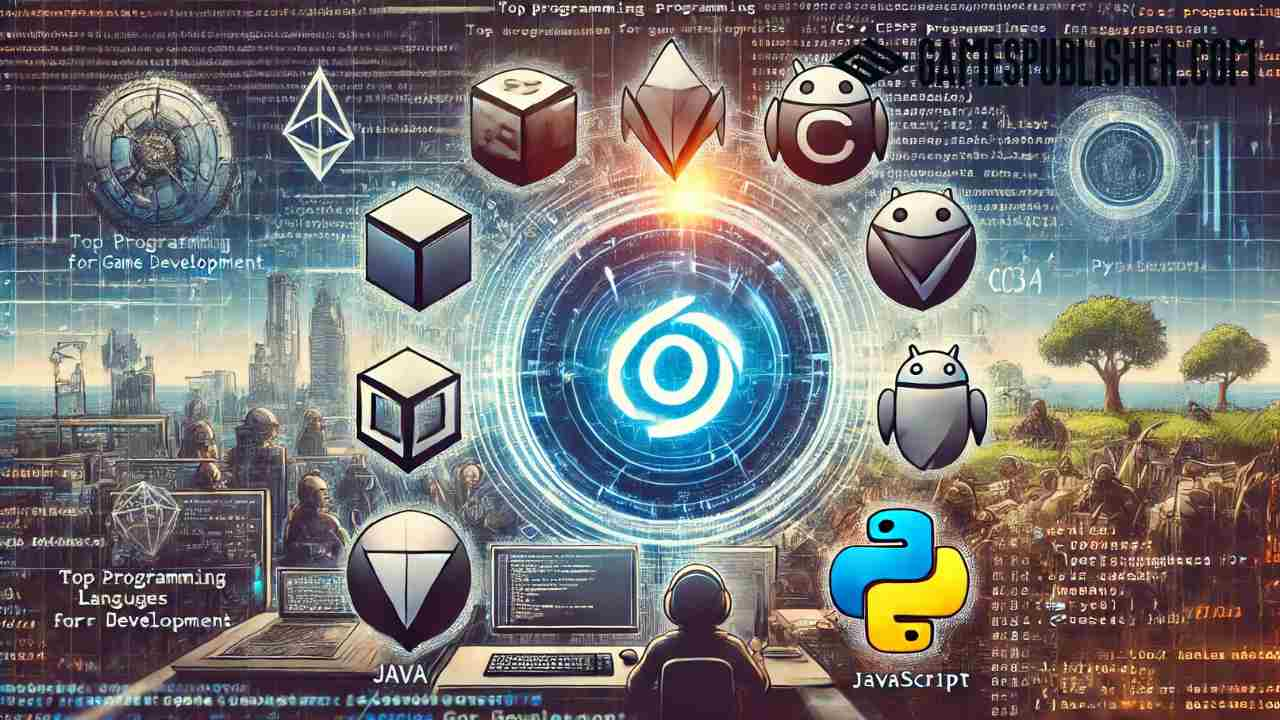Selecting the correct programming language for a game is a significant factor in developing the game. It has straight implications for the game’s playability, creation, and management of changes.
In the rather inclusive and competitive environment for gaming, selecting the correct programming language is not just a matter of launching a new project but a firm’s strategy for long-term and sustainable growth.
In this article, we’ll go through some of the most widely used and promising programming languages in game development in 2026.
Overview of Game Development Programming Languages
The world of game development has a relatively great variety of programming languages, ranging from C++ to C# and Java.
Console and PC games use the basic capabilities of C++ to achieve high graphics and sophisticated simulations.
On the other hand, the audience for mobile game authors often tends to prefer Java (Android) or Swift (IOS) due to the compatibility of the languages and other features.
So, selecting the proper language for a particular game is significant.
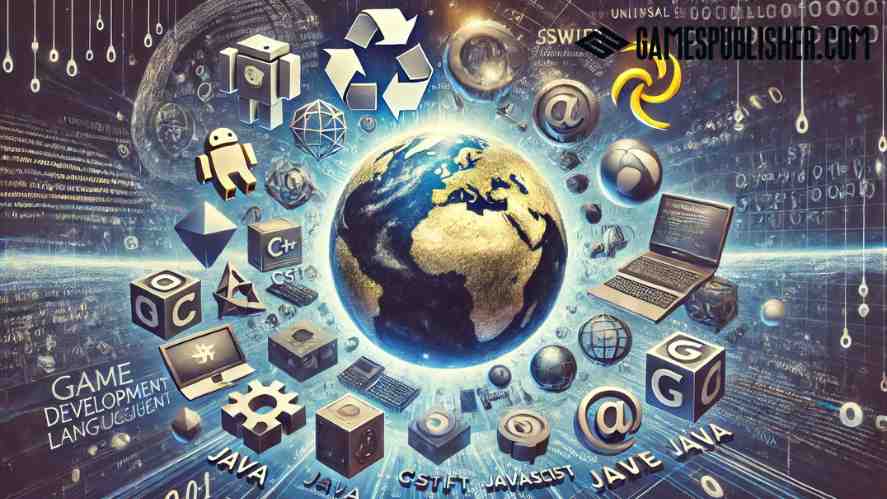
This is undoubtedly an everlasting question concerning performance, time for development, and the competencies of the development team in the gaming industry.
What’s New in Game Development Programming Languages in 2026
In 2026, game development programming languages are evolving alongside changes in hardware, engines, and production workflows. While core languages like C++, C#, and Java remain dominant, how developers use them has shifted significantly.
One major trend is the growing emphasis on performance scalability for cross-platform games. Modern titles are increasingly expected to run across PC, console, cloud, and mobile ecosystems.
As a result, languages that integrate tightly with scalable engines and tooling are favored, especially those that support modular builds, engine scripting layers, and platform-specific optimization.
Another notable shift is the rise of AI-assisted development workflows.
In 2026, many developers use programming languages alongside AI-powered tools for code completion, debugging, procedural content generation, and NPC behavior scripting.
Languages with strong tooling ecosystems and clean syntax benefit most from this shift, as they integrate more smoothly with AI-driven development environments.
Multiplayer and live-service architecture has also influenced language selection. Games now rely heavily on backend services, real-time networking, and cloud-hosted systems.
This has increased the importance of languages suited for server-side logic, concurrency, and networking, especially for matchmaking, analytics, and persistent online worlds.
Additionally, safety and maintainability have become higher priorities for long-term projects. Studios are paying closer attention to memory safety, concurrency handling, and long-term code health.
This has opened the door for newer or specialized languages to complement traditional ones in performance-critical or server-side components.
Top 5 Popular Programming Languages for Game Development in 2026
The following is a list of the top 5 computer programming languages that have stood the test in game development.
These programming softwares are pretty general-purpose yet provide the required level of performance to be used in various game genres and platforms.
1. C++

Based on the C programming language, C++ has been a foundational game development language since the early 1990s.
It is possible to provide incredible performance and precise control for the resources in the game. That is why many AAA games and game engines, such as Unreal Engine, use it.
C++ gives programmers low-level control over the system, which is perfect for fine-tuning the computer to produce the best code.
Moreover, it’s the language preferred for building games due to its ability to directly control memory and software and hardware resources more efficiently, thereby avoiding any hindrance to gameplay.
Lastly, one of the significant advantages of using C++ is the availability of numerous libraries and frameworks that help develop and speed up processes.
The versatility and capability of C++ can be evidenced by the rise of several triumphant projects that were and are created in this language.
Notable titles developed with C++ include:
- Counter-Strike: Global Offensive
- Fortnite
- The Witcher 3: Wild Hunt
Thus, C++ should be accorded a reputation for being a robust and flexible language for developing games.
It is still a game development engine of choice to produce games with intense graphical appeal and severe numerical processing resource requirements.
2. C#
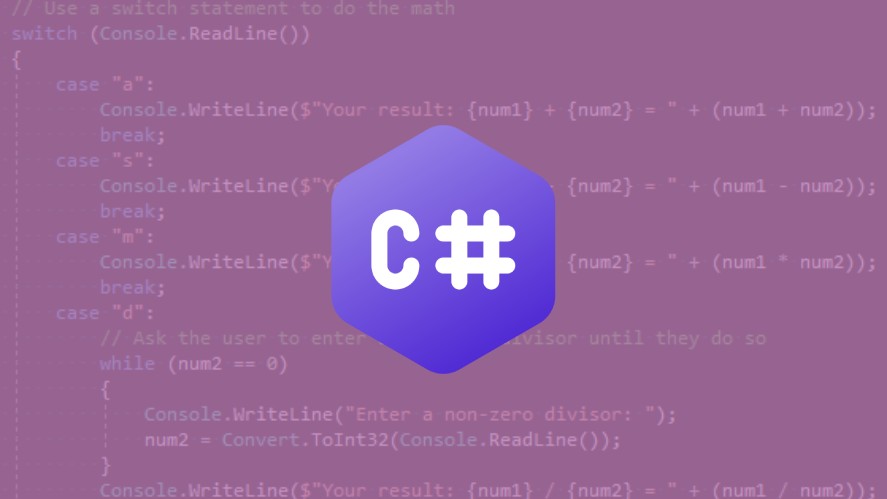
C# emerged in the early 2000s as a modern, object-oriented language designed for simplicity and productivity.
Its seamless integration with the Unity game engine has catapulted it to the forefront of game development, especially for indie developers and beginners.
C#’s straightforward syntax and extensive libraries make learning and use easier than lower-level languages like C++. This allows developers to focus on game logic and design rather than wrestling with complex code.
In addition, C#’s high-level abstractions and garbage collection simplify memory management, enabling faster iteration and development cycles.
C#’s accessibility and Unity’s widespread adoption have led to a thriving community of indie game developers and a plethora of successful games built with this language.
Notable game titles include:
- Hollow Knight
- Cuphead
- Among Us
Overall, C#’s ease of use, powerful tools, and vibrant community make it an attractive option for aspiring and experienced game developers.
3. Java

Java, released in 1995, has become a powerhouse in the software development world due to its platform independence and robust community support.
While not the first choice for high-performance AAA games, Java’s portability has made it popular for mobile game development, especially on Android.
Java’s “write once, run anywhere” principle allows developers to create code that runs seamlessly on multiple platforms without modification. This is a significant advantage for mobile games targeting various devices.
Moreover, Java has a massive and active community of developers with many libraries, frameworks, and tools. This translates to readily available support and resources for game developers.
Java is also the official language used in Android app development. The Android SDK provides a comprehensive set of tools and APIs designed explicitly for building Android games.
While Java may not be the go-to language for graphics-intensive games, its portability and strong community support have enabled the creation of numerous successful mobile titles.
Some notable examples include:
- Minecraft
- Mission Impossible III
- SimCity BuildIt
Java is a powerful language for game development. Its extensive ecosystem and thriving community ensure developers have the tools and support to create engaging and successful games.
4. Python

Python, first released in 1991, has gained immense popularity recently due to its simplicity, readability, and ease of learning.
While not typically used for high-performance AAA games, Python’s flexibility and rapid development capabilities make it popular for prototyping, scripting, and creating more minor games.
Python’s clean syntax and emphasis on readability make it an excellent choice for beginners and those who value clean, maintainable code.
Python also offers many libraries and frameworks for game development, such as Pygame, Panda3D, and Kivy.
Python’s versatility has led to various game development scenarios. It’s commonly used for prototyping game mechanics, scripting in-game events, and creating educational or casual games.
Some notable examples include:
- Mount & Blade
- Civilization IV
- Disney’s Toontown Online
While not typically used for the most demanding games, Python’s ease of use and rapid development capabilities make it a valuable tool in the game developer’s arsenal.
It empowers novice and experienced developers to quickly experiment, iterate, and bring their game ideas to life.
5. JavaScript and HTML5
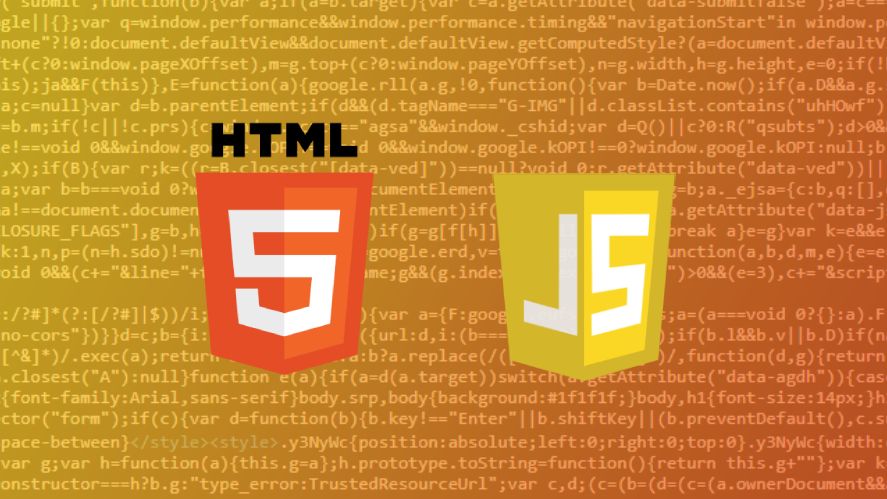
JavaScript and HTML5 have revolutionized web-based game development, enabling the creation of immersive and interactive experiences directly in the browser.
With the rise of powerful JavaScript game engines and frameworks, developers can craft sophisticated 2D and 3D games that rival their native counterparts.
JavaScript games run natively in web browsers, making them accessible to a vast audience without requiring downloads or installations.
In addition, JavaScript games can be played on various devices, including desktops, laptops, tablets, and smartphones, as long as they have a modern web browser.
JavaScript also offers a rich ecosystem of libraries and frameworks like Phaser (for 2D) and Three.js (for 3D), simplifying game development and accelerating project timelines.
The versatility of JavaScript and HTML5 has created a wide range of browser-based games, from simple 2D arcade games to visually stunning 3D experiences.
Some notable examples include:
- Bejeweled
- 2048
- HexGL
With its accessibility, cross-platform compatibility, and rich ecosystem, JavaScript and HTML5 continue to empower game developers to create engaging and accessible games for a global audience.
The rise of cloud gaming and progressive web app technologies further solidifies JavaScript’s position as a leading force in the future of the video game industry.
Factors to Consider When Choosing a Programming Language
Choosing the perfect programming language for your game development project involves carefully considering several key factors.
These factors encompass the type of game you’re creating, your team’s experience and skillset, performance requirements, and the specific tools and platforms you intend to use.
Performance Requirements
Performance is the cornerstone of many game development projects, especially those with demanding graphical requirements or complex simulations.
Different programming languages offer varying degrees of performance, often depending on their level of abstraction and control over system resources.
Low-level languages like C++, renowned for their raw speed and direct hardware manipulation, are preferred for high-performance, resource-intensive games.
Conversely, higher-level languages like C# and Java, while offering greater ease of use and faster development cycles, may not match the raw performance of C++.
These languages often rely on abstractions and automatic memory management, which can introduce overhead and impact performance in demanding scenarios.
Development Speed and Learning Curve
The learning curve associated with a programming language can significantly impact the project timeline and the development team’s efficiency.
Languages like Python and C#, known for their clear syntax and user-friendly features, offer a gentler learning curve than more complex languages like C++.
For indie developers or smaller teams with limited resources, prioritizing development speed and a shorter learning curve can be advantageous.
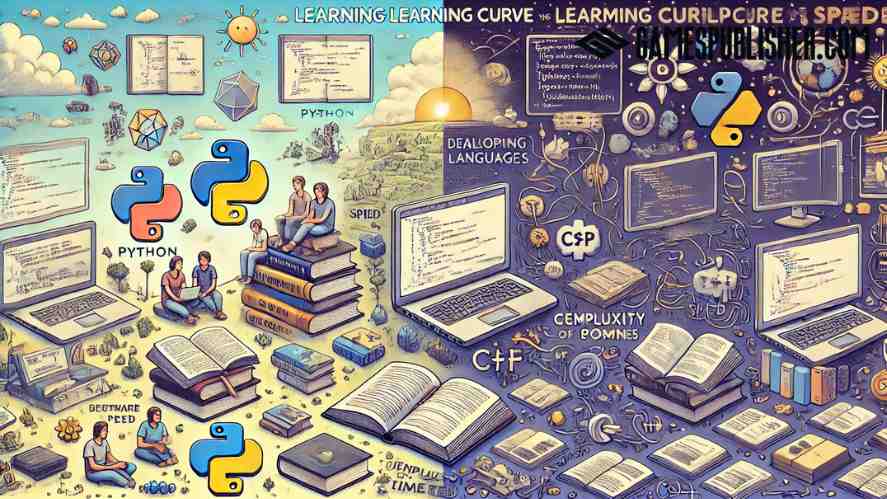
Choosing a language that is easy to pick up and allows for rapid prototyping and iteration can significantly accelerate the development process.
However, a more robust and powerful language like C++ might be preferred for larger projects or those with demanding performance requirements, even with its steeper learning curve.
So, balancing the need for speed with the complexity of the language is essential to ensure a smooth and efficient development process.
Community and Support
A thriving community and a vast network of support resources can prove invaluable during the game development journey.
Languages with large communities, like Java and JavaScript, always offer many tutorials, forums, and libraries.
It enables developers to quickly find solutions to common challenges and learn from the experiences of others.
A vibrant community can provide ongoing support, updates, and resources that contribute to the long-term success of your project.
It’s also worth investigating the availability of official documentation, tutorials, and online courses specific to game development in your chosen language.
Platform Compatibility
The gaming landscape encompasses various platforms, including PCs, mobile devices, consoles, and the web.
Different programming languages cater to other platforms, making it crucial to align your language choice with your target audience.
Languages like Java and Swift are popular choices for mobile game development, thanks to their native support for Android and iOS platforms, respectively.
C++ remains dominant in PC and console game development, powering many AAA titles and game engines like Unreal Engine.
Understanding the strengths and weaknesses of each language on your target platform is essential for ensuring a seamless and successful deployment of your game.
Tool and Engine Support
The availability of game engines, frameworks, and development tools that support your chosen language can significantly impact your productivity and workflow.
Many popular game engines, like Unity and Unreal Engine, offer robust support for specific languages, providing many features, assets, and integrations to streamline development.
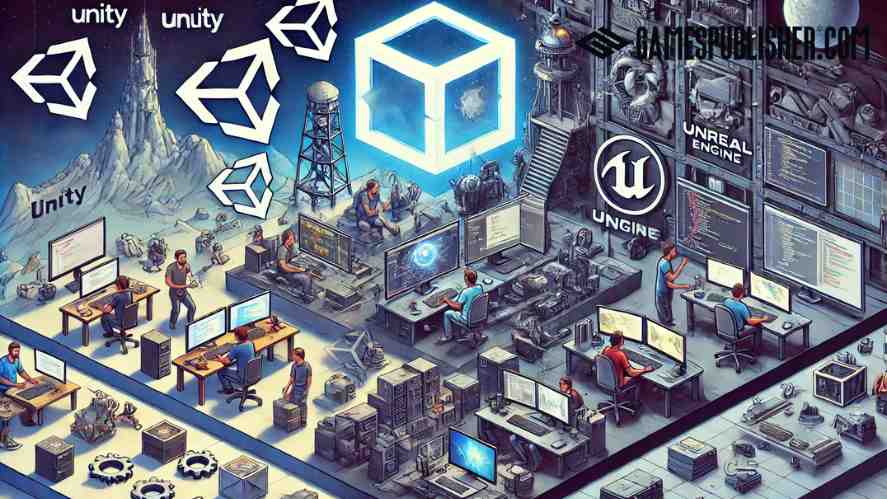
Before settling on a programming language, research the availability of game engines and tools that align with your chosen language.
Choosing a language well-supported by your preferred tools can save you valuable time and effort, allowing you to focus on the creative aspects of game development.
Emerging and Specialized Languages
The game development landscape constantly evolves, with new and specialized languages emerging to address specific needs and challenges.
While established languages like C++, C#, and Java remain dominant, these emerging languages offer exciting possibilities for the future of game development.
1. Rust
Rust is a relatively new language gaining traction in the game development scene. It offers a unique blend of performance, safety, and control.
While still considered a niche language in this domain, its potential is undeniable, particularly for systems-level programming and performance-critical components.
Benefits for Game Development
- Memory Safety: Rust’s ownership system and strict compile-time checks prevent common programming errors like null pointer dereferences and data races, leading to more robust and reliable game code.
- Performance: Rust’s zero-cost abstractions and lack of garbage collection deliver performance comparable to C++, making it a compelling alternative for resource-intensive games.
- Concurrency: Rust’s built-in concurrency features and focus on thread safety enable efficient utilization of modern multi-core processors, which are essential for maximizing performance in complex game simulations.
Examples of Use
While still in its early stages of adoption in game development, Rust is already being used in various projects, including:
- Veloren: An open-world multiplayer voxel RPG built entirely in Rust, showcasing the language’s potential for large-scale game development.
- Amethyst: A data-driven and feature-rich game engine built with Rust, emphasizing performance, safety, and modularity.
- Piston: A modular game engine providing building blocks for 2D game development in Rust, allowing for greater flexibility and customization.
2. Go
Go (Golang), a new programming language developed by Google and first released in 2009, is carving its niche in the game development landscape.
Its simplicity, strong typing, and built-in concurrency features make it well-suited for building scalable and reliable network applications, often crucial for multiplayer games and online services.
Go’s efficient garbage collector helps prevent memory leaks and ensures smooth performance even under heavy load.
While Go’s performance may not match that of lower-level languages like C++, it’s still considered fast and efficient enough for many game development tasks, particularly those related to server-side logic, networking, and tools development.
Go’s growing popularity in the cloud infrastructure and networking space has also led to increased adoption in game development.
More games now depend on cloud-based services for matchmaking, data storage, and real-time communication.
3. Lua
Lua, a lightweight and embeddable scripting language, has carved a unique niche in the game development landscape, primarily as a scripting language for customizing and extending game logic.
Its simplicity, flexibility, and ease of integration have made it a popular choice for game developers seeking to empower players with modding capabilities or add dynamic elements to their games.
Lua’s most notable application is Roblox, a popular online game platform and creation system.
Roblox allows users to create games and experiences using Lua scripts, fostering a vibrant community of creators and players.
Another prominent example of Lua’s use of in-game scripting is World of Warcraft, a multiplayer online role-playing game.
Lua is used extensively in World of Warcraft’s user interface customization and addon system, enabling players to personalize their gameplay experience and create powerful tools and enhancements.
Case Studies and Success Stories
The success stories of renowned game titles often shed light on the strengths and capabilities of the programming languages that underpin them.
C++ Powerhouses
Games like The Witcher 3: Wild Hunt and Counter-Strike: Global Offensive test C++’s ability to handle complex game mechanics, stunning visuals, and massive virtual worlds.
CD Projekt Red, the developers of The Witcher 3, have consistently praised C++ for its performance and flexibility. It allows them to create a vast and immersive open-world experience.
C# and Unity Success
Hollow Knight, a critically acclaimed indie game, showcases the power of C# and the Unity engine in crafting visually stunning 2D worlds with intricate gameplay mechanics.
Team Cherry, Hollow Knight’s developers, have highlighted the ease of use and rapid iteration offered by C# and Unity. This allows them to create a polished and engaging game with a small team.
Java’s Mobile Dominance
Minecraft, one of the best-selling video games of all time, demonstrates Java’s versatility and portability in mobile gaming.
Markus Persson, Minecraft’s creator, allowed it to run on various platforms and reach a massive audience.
Python’s Scripting Prowess
While not typically used for entire game development, Python’s scripting capabilities have proven invaluable in games like Civilization IV and Mount & Blade.
These games utilize Python for modding and scripting, allowing players to create custom content and extend the game’s lifespan.
These case studies illustrate the diverse applications of popular development languages in game development.
Aspiring game developers can draw inspiration from these success stories and learn from the experiences of seasoned professionals to make informed decisions about their own language choices.
Conclusion
The game development landscape is a vibrant ecosystem, offering various programming languages to suit project needs.
From established giants like C++ and Java, known for their performance and portability, to emerging contenders like Rust, celebrated for their safety and concurrency, each language brings unique strengths.
Choosing the correct software language requires considering your project’s scope, target platform, and team expertise, as well as researching strengths and weaknesses and exploring tools before deciding on your game development journey.
Remember, the correct language can empower you to create immersive and engaging games that captivate players worldwide.
Loading survey...

